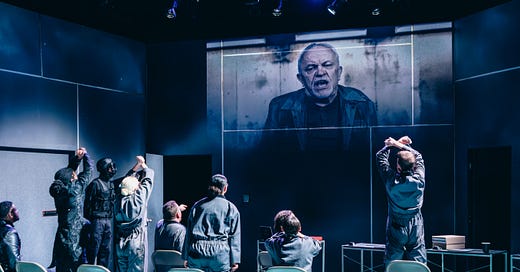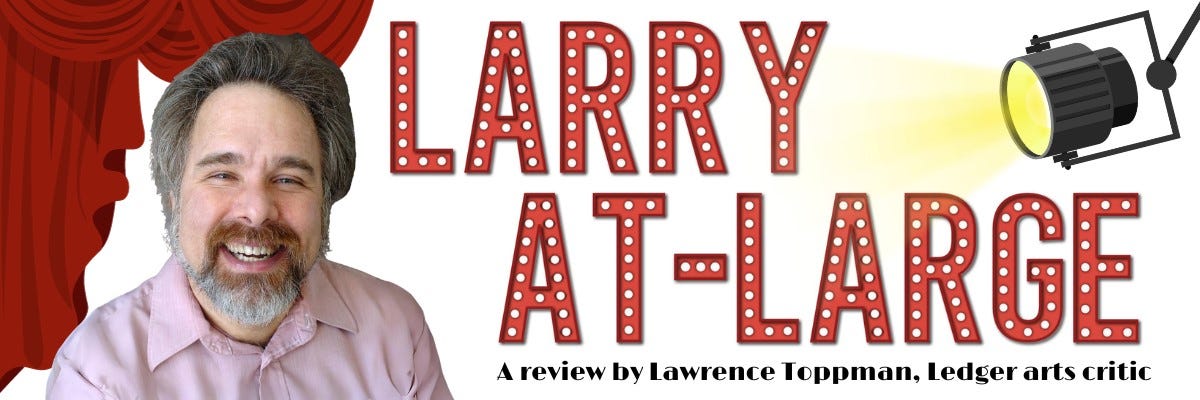'1984,’ now at Theatre Charlotte, never goes out of date
'1984' is on stage at Theatre Charlotte, 501 Queens Road, through Nov. 10
This review by longtime Charlotte arts critic Lawrence Toppman was published by The Charlotte Ledger on October 27, 2024. You can find out more about The Charlotte Ledger’s commitment to smart local news and information and sign up for our newsletter for free here. And check out this link for Toppman’s archive of reviews in the Ledger.
Orwell’s ‘1984’ returns to the stage in a faithful adaptation that still haunts
The set and costume design in Theatre Charlotte’s “1984” are cast in gray, broken up only by bits of crimson and orange that represent the state. (Photo courtesy of Theatre Charlotte)
by Lawrence Toppman
George Orwell’s “Nineteen Eighty-Four” appeared 75 years ago this summer, warning readers of the dangers posed by totalitarianism. He took Stalin as his model, with Hitler vaguely in the background. Since then, history’s parade of murderous dictators — starting with Mao Zedong, who took power four months after the book came out — has continually proved Orwell prescient. A theatrical adaptation at Theatre Charlotte, which runs up to and beyond the 2024 presidential elections, gives us a timely chance to reflect.
The stage version by Robert Owens, Wilton E. Hall Jr. and William A. Miles Jr. remains faithful to the novel in the important ways, eliminating minor characters for reasonable economy of storytelling. Director Chris Timmons, assisted by Chloe Shade, has spared us none of the psychological and (briefly) physical torture Winston Smith undergoes, as he tries to maintain his individuality in a world where it represents “thoughtcrime.”
Timmons’ set design and Rachel Engstrom’s costumes fill the stage with layers of gray, relieved only by bits of color that represent the state: a crimson V applied to shoddy products from state-run Victory factories, the unseen orange inferno where officials burn historical evidence to create “unpersons,” the red belt around the waist of a young woman who imagines she’s free but is tethered to her tormentors.
She’s Julia (Isabella Frommelt), a new worker at the Ministry of Truth who takes a sudden liking to anxious deskmate Winston Smith (Chris Patton, in a searingly intense performance). Both of them become thought criminals almost without realizing it, longing to express themselves freely. They marry, move into a dingy apartment run by a gabby “prole” (Caryn Crye), and accept help from the mysterious O’Brien (Dionte Darko), a high-ranking official who tells them he’s secretly undermining the party on behalf of a revolutionary cadre.
Orwell called his novel a satire and told a friend “I do not believe that the kind of society I describe will necessarily arrive, but I believe … something resembling it could arrive.” The play has more of a sense of inevitability: Winston and Julia will be ground up in the gears of the implacable governmental machine. The question is how they’ll come out of that process.
A film can open up this story, showing the massive scope of the government offices or the dirty streets of the oppressive city. A play can’t, and this one may seem talky and constricted as a result; I didn’t mind that, as it’s about ideas and moral dilemmas, rather than action.
Timmins and the actors drain the play of warmth as far as they can — too far, I think, in the case of O’Brien. In the novel and both film versions, he entices the unfortunate couple with amiability, rather than cowing them with his power. Nor is there much humor, though I laughed out loud when newlywed Julia tried unsuccessfully to seduce a husband bewitched by a book of counter-revolutionary propaganda. I did wish the cast had abandoned British accents: Some achieve them (notably Patton), some don’t or don’t try, and Crye’s Cockney outbursts remain unintelligible most of the time.
Yet they all do a compelling job of summoning a world where every word, spoken wakefully or in sleep, can be captured and analyzed for deviation from a narrowly defined norm. Video monitors provide faux “news reports” and offer physical training but mostly spy on citizens 24 hours a day, assisted by countless informers.
I’ve recently read that nearly a million CCTV cameras reportedly blanket London, where the average person is recorded 300 times a day. (Said footage is supposed to be discarded after two weeks.) Orwell might have been, and might have wanted us to be, concerned about the state’s intrusion into the lives of ordinary people. But I doubt he’d be surprised.
If You’re Going: “1984” runs at Theatre Charlotte, 501 Queens Road, through Nov. 10 at 7:30 p.m. Thursday, 8 p.m. Friday-Saturday and 2:30 p.m. Sunday.
Lawrence Toppman covered the arts for 40 years at The Charlotte Observer before retiring in 2020. Now, he’s back in the critic’s chair for the Charlotte Ledger — look for his reviews about two times each month in the Charlotte Ledger.
Need to sign up for this e-newsletter? We offer a free version, as well as paid memberships for full access to all 4 of our local newsletters:
➡️ Opt in or out of different newsletters on your “My Account” page.
➡️ Learn more about The Charlotte Ledger
The Charlotte Ledger is a locally owned media company that delivers smart and essential news through e-newsletters and on a website. We strive for fairness and accuracy and will correct all known errors. The content reflects the independent editorial judgment of The Charlotte Ledger. Any advertising, paid marketing, or sponsored content will be clearly labeled.
Like what we are doing? Feel free to forward this along and to tell a friend.
Social media: On Facebook, Instagram, Twitter and LinkedIn.
Sponsorship information/customer service: email support@cltledger.com.
Executive editor: Tony Mecia; Managing editor: Cristina Bolling; Staff writer: Lindsey Banks; Business manager: Brie Chrisman, BC Creative




